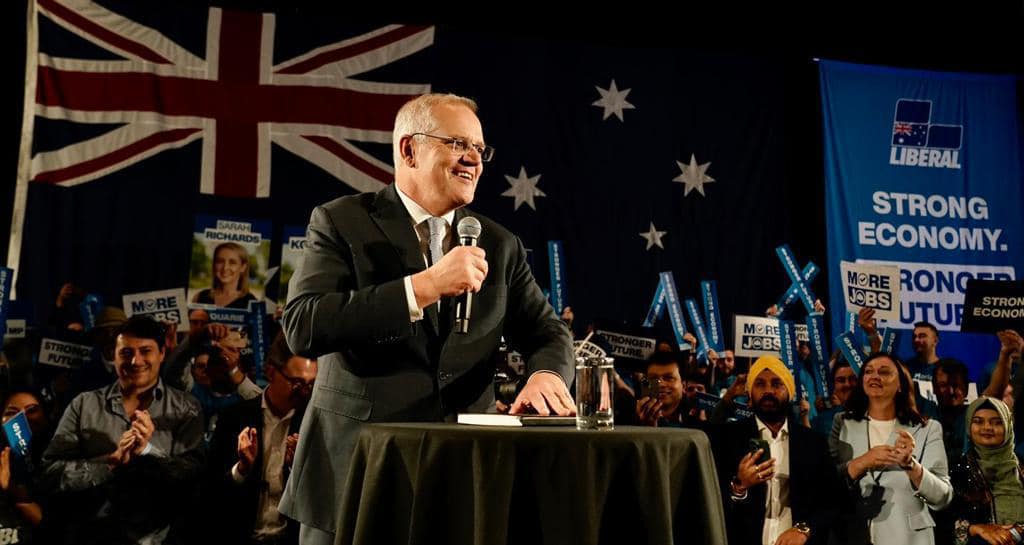
In one of two articles looking at the men who are vying to be the next Australian Prime Minister, political columnist MICHELLE GRATTAN examines the political character of Scott Morrison.
REVEALING insights into Scott Morrison’s political character and tactical approach are coming through as the Prime Minister finds himself on the ropes towards the end of this campaign.
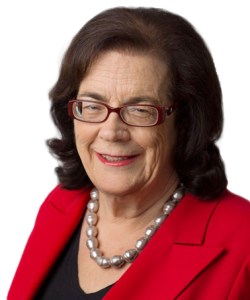
In last Wednesday’s final debate between the two leaders, when they were asked to speak to the other’s strengths, Morrison praised Albanese’s never forgetting where he came from – but then launched, unwisely, into why his opponent was unfit to be Prime Minister.
When he sensed he’d misjudged with the jibe, he quickly reached for an excuse, suggesting he “must have misunderstood the question”.
On Friday and Saturday, with polling continuing to show Labor in a winning position, he held out the promise of a reshaped Scott.
He said on Friday “Australians know that I can be a bit of a bulldozer” and pledged some change if re-elected. The following day he declared, “I will seek to […] explain my motives and my concerns and empathise a lot more”.
It was a brazen bid, but would it be believed by an electorate deeply sceptical about him? Or would he be seen as the chameleon willing to say anything in the moment?
Morrison’s Prime Ministership is the story of a leader who has lost, to an extraordinary degree, community trust as well as personal support within his party.
The PM who in 2019 clawed his way to victory, against expectations, to become the hero who delivered the “miracle” win for the government, is now widely seen among many Liberal MPs as a major drag on their vote.
He’s become so disliked in the city seats where moderate Liberals are under siege from “teal” independents that he can’t campaign in those electorates.
In March 2020, Roy Morgan conducted a survey of Australians asking respondents to name, unprompted (with no list), any politicians they trusted and any politicians they distrusted. This research measures not just trust or lack of trust, but also the far more toxic measure of distrust. The March 2020 survey found that only eight per cent of respondents trusted Morrison while more than twice the percentage of respondents, at 17 per cent, distrusted him. When the survey was repeated in March 2022, Morrison’s unprompted trust had fallen to just six per cent of respondents, with the unprompted distrust level increasing to 25 per cent – more than four times the percentage of respondents who trust him.
Morrison was the most distrusted politician in both surveys.
The most common reason for distrust in both years was telling lies, being dishonest or misleading – this reason for distrust increased from 35 per cent of the reasons for distrust in Morrison in March 2020 to 46 per cent in March 2022.
As Prime Minister, Morrison has been non-ideological, totally focused on winning, ruthless, transactional, controlling. It’s “always tactics” rather than strategy, says a source who’s observed him closely in government.
A Liberal who has dealt extensively with him says: “He’s completely unencumbered by belief and values – which makes him so effective. His beating heart is a focus group.”
Morrison might be “unencumbered by belief” but he’s well endowed with self-belief, bolstered in considerable part by his Pentecostal faith.
In 2021 he recounted, in a video speech to a Christian audience, how when visiting a photographic gallery late in the 2019 campaign he was looking for a sign from the Lord.
“And there right in front of me was the biggest picture of a soaring eagle that I could imagine and of course the verse hit me […]. The message I got that day was, ‘Scott, you’ve got to run, to not grow weary, you’ve got to walk, to not grow faint, you’ve got to spread your wings like an eagle to soar like an eagle.’”
As this campaign draws to its challenging close, Morrison – who says he prays every day – might be again looking for a sign.
On his way to the Prime Ministership, Morrison positioned himself adroitly in the coups against predecessors Tony Abbott and Malcolm Turnbull. His henchmen in his small, tight factional group looked to his advancement. Morrison himself wore gloves, giving him superficial deniability, although the evidence suggested otherwise.
Turnbull, in his autobiography “A Bigger Picture”, describes a dinner in December 2014 when Morrison felt Abbott “would have to go by the middle of 2015 if his performance didn’t improve. […] He was closely in touch with the key figures at News, he told me, and said they were getting ready to dump Abbott.”
In both coups, there were indications of tactical voting by the Morrison allies to promote change, while Morrison himself could stay “loyal”.
Before the 2019 election, Morrison successfully projected his “ordinary Joe” personal story – Sharks-tragic, curry-cooking dad from The Shire. Sean Kelly writes in “The Game: A portrait of Scott Morrison”: “When he became Prime Minister, we did not know much about him. Quickly, he set about helping us to know him […] We were given just a few details; we were given them over and over again.”
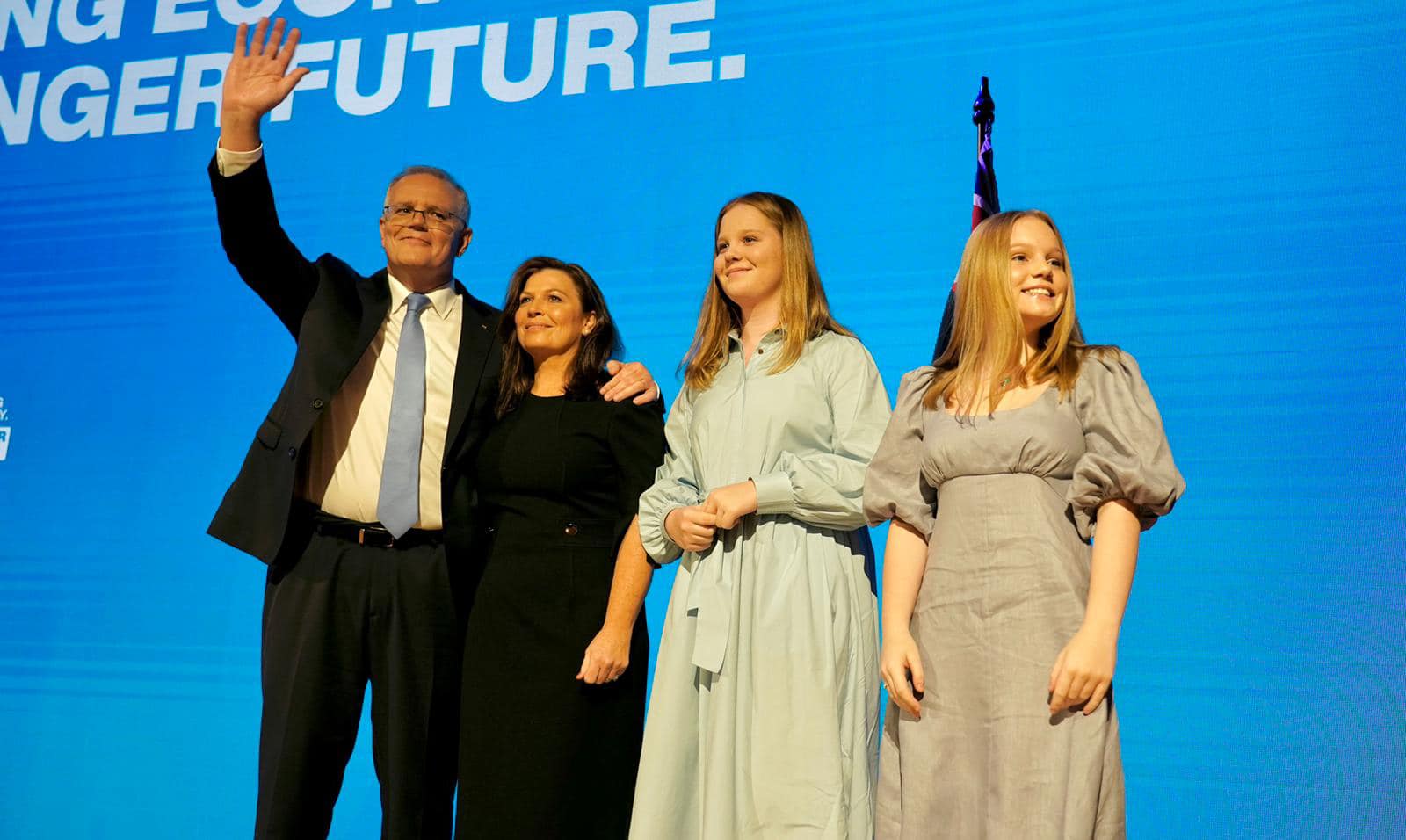
The family motif is central in the Morrison story. Wife Jenny is mobilised – literally as his better half, because people like her – when he’s trying to smooth away trouble. His mother Marion was flown interstate to make an appearance at a rally on Mother’s Day.
Morrison is arrogant, and naturally reluctant to admit error, but started to do so, to a limited degree, when tactics required. Asked by Anthony Albanese during the second campaign debate about his infamous “it’s not a race” claim on the vaccine rollout, he said: “It was a race, Anthony, and we shouldn’t have described it in those terms”. While the dominant narrative has been his dodging of personal responsibility, now, when lauding the Coalition’s achievements, he admits that the government, and he, didn’t get everything right.
His dodging responsibility was dramatised during the 2019-20 bushfires, when the Morrison family went on a December holiday to Hawaii. This incident has become totemic in defining him negatively in the public mind.
Not only was the trip’s timing misjudged, but the Prime Minister’s Office shrouded it in in secrecy and lied to the media about it. Trying to justify himself, Morrison delivered the line that would hang around his neck for the rest of the term, “I don’t hold a hose, mate”.
From then on, his critics repeatedly accused him of refusing to accept personal responsibility for mistakes and problems, especially the delays and other failures in the vaccine rollout and the shortage of RATs.
In a symbolic gesture when he became leader, one of Morrison’s first acts was to take his team to Albury, where Robert Menzies and other Liberal party founders had met. Paying homage to Menzies is a ritual for Liberal leaders.
But Morrison is a long way from Menzies in his thinking. A notable example is their views on education. Menzies respected learning and culture, and greatly expanded Australia’s university system. Morrison is dismissive of intellectuals and the humanities, and sees universities in large part as education factories to turn out job-ready workers.
Morrison has accelerated the trend, that began under John Howard and continued under Tony Abbott, of taking the Liberal party away from its earlier middle class base, to pitch to outer suburban male “tradies”.
The rise of the “teal” independents, fighting especially on issues of climate change and integrity, is in part a reaction to this. These candidates, mostly professional middle class women and including two from Liberal “royalty” (Allegra Spender and Kate Chaney), are also a contrast to Morrison’s “blokey” pitch.
Judith Brett, emeritus professor of politics at La Trobe University, says that “under Menzies, the ‘moral middle class’ saw its vote in terms of its perception of the national interest, not simply self interest. The teal independents are all running on national policies – climate change, integrity – not hip pocket issues.”
Morrison has increasingly alienated many female voters. Their antipathy is not just driven by the scandals involving politicians and bad behaviour at parliament house. Women know they are not Morrison’s primary constituency and the polling suggests they respond in kind. In counterpoint, Morrison has been anxious to find and run female candidates.
An analysis last week by the Australian Financial Review of its Ipsos polls found Morrison’s approval, “which was 44 per cent among women at this same time of the 2019 election campaign, now averages just 29 per cent over the past three polls”.
Just as women voters are secondary to male voters in Morrison’s sights, so too inner city Liberal electorates have been relegated as he pitches to the outer suburbs and ethnic voters.
Morrison has appeared willing to cut loose the moderate Liberals in the “leafy” seats. This was notable in his captain’s pick of Katherine Deves as candidate for Warringah (held by independent Zali Steggall) who had posted offensive comments about trans people. Morrison believed her crusade to protect women and girls in sport from trans competitors would resonate in areas with high ethnic populations.
One politically strange aspect of Morrison’s behaviour has been the contempt with which he has treated his home-state NSW Liberal party, of which he was once state director.
His factional ally Alex Hawke frustrated for months the party membership’s aspirations for rank-and-file preselections, because Morrison wanted to install his favoured candidates, in what was seen as some long-term ploy to boost his numbers.
Eventually he got his way: candidates for a clutch of seats were chosen by a committee he headed. But this triggered a party crisis, as well as giving the candidates little time to establish themselves with voters. There’s now deep anger among many NSW party members, making it difficult for the party to muster enough volunteers to help during the campaign, especially in Warringah.
Morrison’s attitude to the NSW party is typical of his wider desire for control. Ministers such as Peter Dutton chafe at the Prime Minister’s Office’s interference, as it attempts to drive the government’s messaging.
Morrison eschews transparency and accountability. The government fought, unsuccessfully, legal proceedings brought by crossbench senator Rex Patrick, as it tried to keep the minutes and other documents of the national cabinet immune from freedom of information requests. It argued (ludicrously) that the national cabinet was a committee of the federal cabinet.
Even after the defeat, Morrison’s department has blocked attempts to get additional material, beyond the documents in the case. Patrick says: “The Prime Minister’s conduct is an affront to the rule of law. He’s usurped the judgement to satisfy his secrecy addiction.”
Morrison regards the public service as part of the “Canberra bubble”, there to deliver but not to free range with its advice. His choice for head of his department, Phil Gaetjens, who was his chief of staff when Morrison was treasurer, is viewed by the bureaucracy as basically a political operative.
The widespread push for a national integrity commission has run foul of Morrison’s deep animosity towards the NSW Independent Commission Against Corruption. He’s been highly critical of its inquiry into Gladys Berejiklian’s conduct, and condemns ICAC as a “kangaroo court”. In turn, he has been on the receiving end when an ICAC commissioner, Stephen Rushton, labelled those who used that term “buffoons”‘. Morrison refuses to compromise on his restrictive model for a federal commission, which has been widely criticised.
The PM is a media manipulator par excellence. He and his office are intimately tied into the Murdoch media, and particular journalists. They use The Australian and the News Corp tabloids to place exclusives and deploy dirt. His communications chief Andrew Carswell was formerly with the Daily Telegraph. Sky haranguer Paul Murray is a personal friend.
The Morrison camp sidelines the ABC to the maximum extent possible, despite its chairwoman, Ita Buttrose, being the PM’s choice. During the campaign Morrison refused to do a debate on the ABC, and mostly avoided its programs, although he has a 7.30 interview on Monday night. It is not just a matter of alleged bias. Being against the ABC is part of the culture wars.
Morrison argues the election isn’t a referendum on the government, but he regularly reprises its record of successfully handling the pandemic, saying some 40,000 deaths were prevented.
Undoubtedly, the government’s early closure of Australia’s international border was a crucial and correct decision that saved many lives.
But on the health side, it was the premiers who were often forward-leaning, whether in pushing hard for the initial shutdown (Victoria’s Daniel Andrews, and NSW’s Berejiklian), shutting schools, or closing their own borders. Morrison was routinely in favour of keeping things as open as possible.
He denounced Queensland premier Annastacia Palaszczuk over her tough border policy. He joined Clive Palmer’s court case against the Western Australian government over its border closure (although the federal government subsequently withdrew, realising how much support premier Mark McGowan had).
The federal government’s economic response to the pandemic was strong; JobKeeper kept many businesses and workers afloat (although design flaws meant a good deal of waste).
Morrison is not shy of playing politics against some on his own side. At various times during the bushfires and the pandemic his office briefed against Berejiklian. During the fires, in a (leaked) text Berejiklian called him “a horrible horrible person” who was more concerned with politics than people.
When the NSW environment minister Matt Kean irritated him over climate change, the PM declared slightingly “most of the federal cabinet wouldn’t even know who Matt Kean was”. Current NSW premier Dominic Perrottet is no fan – Morrison swore at him during a dispute when Perrottet was treasurer. In the campaign, Perrottet has not hesitated to stand up for ICAC.
The attacks on Morrison’s character have been particularly devastating politically, because of where they have come from, the terms in which they’ve been cast, and the fact they are documented.
French President Emmanuel Macron declared unequivocally Morrison lied to him over the submarine project. A Barnaby Joyce text (sent to a third party after the Brittany Higgins rape allegation and before Joyce returned to the Nationals’ leadership) described Morrison as “a hypocrite and a liar”, who “I have never trusted”. Morrison “rearranges the truth to a lie”, Joyce said in the text. Turnbull said: “Scott has always had a reputation for telling lies”.
It’s hard to recall any recent Prime Minister who has been “nailed” so comprehensively by credible figures on the “character” issue.
Leaving aside pandemic management, the Morrison government goes to this election with a limited record and an even slimmer fourth term agenda.
Under pressure from moderate Liberals and the Biden and Johnson administrations, Morrison forged a deal with the Nationals to embrace the target of net zero emissions by 2050. But the Coalition’s climate policy remains weaker than those of various states, and Australia is still seen internationally as a laggard.
Morrison had a crack at trying to get business-union consensus on some modest industrial relations reform but little came of it when a limited package went to parliament.
In defence and foreign affairs, Morrison negotiated the AUKUS agreement with the United States and Britain, a major achievement that will also (eventually) bring nuclear-powered submarines. But the government’s Pacific “step up” has been less than successful, with a China-Solomon Islands agreement a substantive problem, and a political challenge in the campaign.
Like Labor, Morrison is not putting forward any ambitious plan for the future. His approach to governing is managerial.
He’s running hard on the government’s economic record. He can point to an unemployment rate of four per cent, set to go lower, and an economy that’s come out of the worst of the pandemic in much better shape than those of most other countries.
His central election mantra is the risk of change. But the headwinds against him are strong. Any government seeking a fourth term is up against an “it’s time” factor. One with a leader such as Morrison is heavily burdened.
Morrison notes that since Howard “I’m the first Prime Minister that has been able to stand for election at the last election and then stand for election again”.
Normally, the end of the Prime Ministerial “rotisserie” would be seen as a good thing. But a few Liberals would reckon they’d be better off if there’d been a chance to put their leader on the spit in the last year.![]()
Michelle Grattan, Professorial Fellow, University of Canberra. This article is republished from The Conversation.
Who can be trusted?
In a world of spin and confusion, there’s never been a more important time to support independent journalism in Canberra.
If you trust our work online and want to enforce the power of independent voices, I invite you to make a small contribution.
Every dollar of support is invested back into our journalism to help keep citynews.com.au strong and free.
Thank you,
Ian Meikle, editor
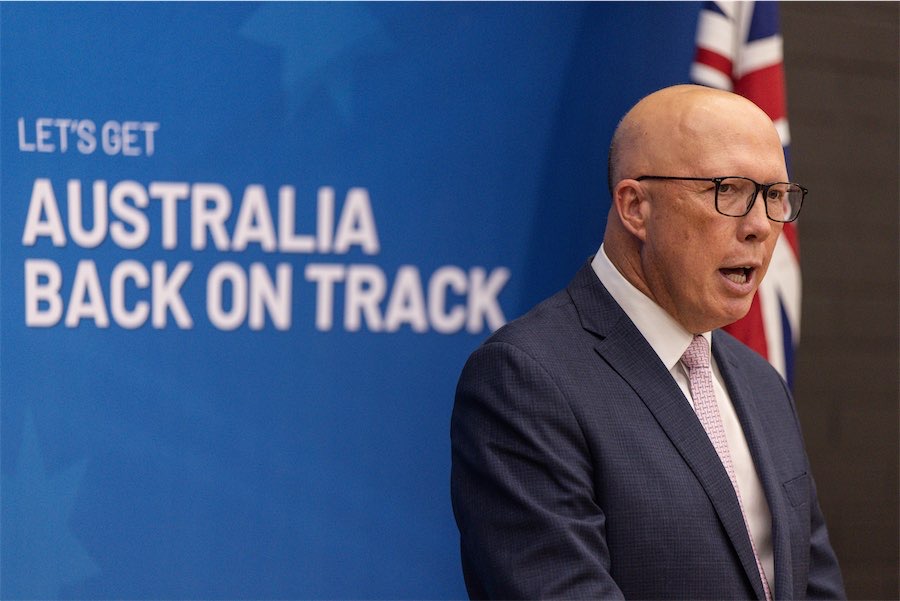
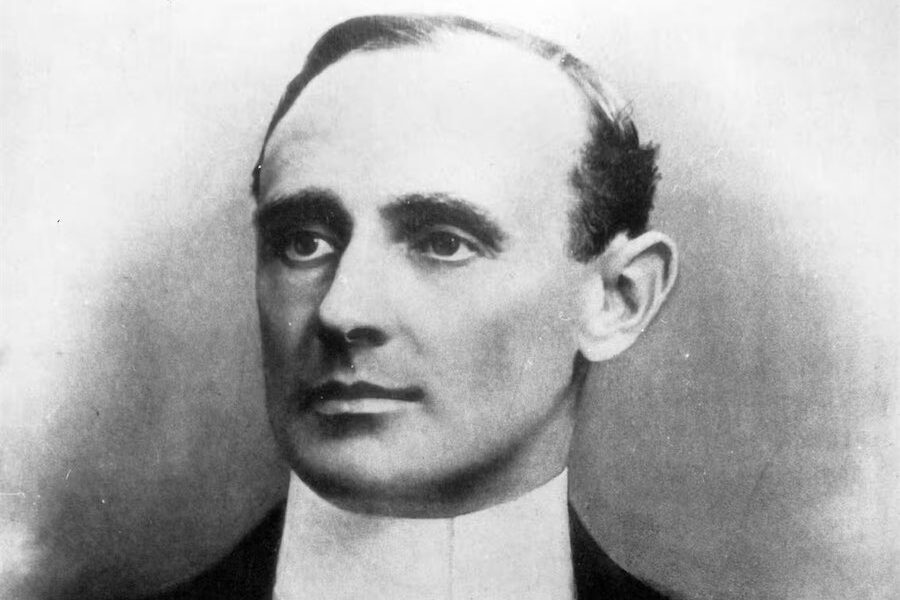
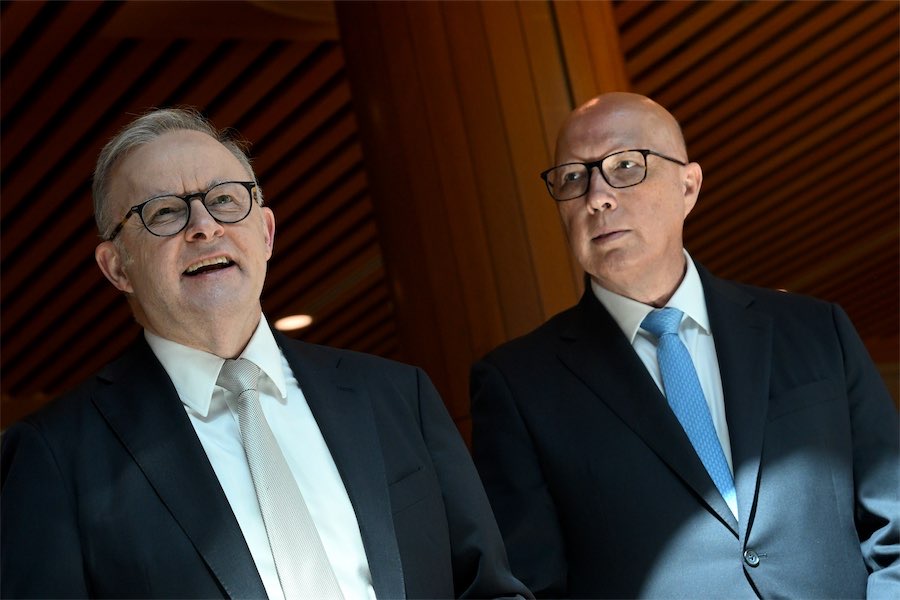

Leave a Reply